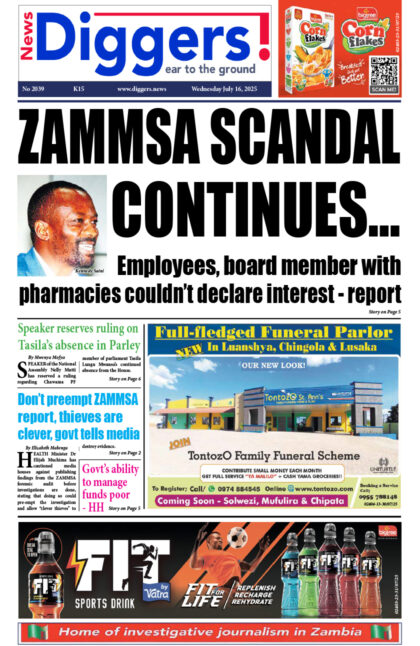The Consumer Unity and Trust Society says ERB is too quick to hike fuel prices whenever factors that determine oil prices on the international market change.
Commenting on the recently announced K1 increment in fuel pump prices by ERB in a statement today, CUTS centre coordinator Chenai Mukumba noted that the Energy Regulation Board was not as enthusiastic when implementing downward shifts in fuel prices.
“As CUTS, we would also like to note that the ERB has been quick to adjust upwards when the two factors that determine the fuel prices (international oil prices and the exchange rate) are not performing well, however, downward shifts in fuel prices are not implemented as enthusiastically as upward shifts. This is based on some calculations made for the period March to August. During this period, the kwacha appreciated against the dollar by 7% from K9.7 to K9.0 and the average cost of crude oil per barrel reduced from $56.63 in March to $47.86 as of 31st June based on data obtained from the ERB press statements,” Mukumba stated.
“When calculated, a barrel of crude oil cost K549 in March and was at approximately at K431 in August, this represented a 21.5% change in oil price per barrel, all other factors held constant, which far exceeded the 2.5% threshold set by the ERB. Despite this, the effected price changes only amounted to a reduction in petrol, diesel and kerosene by only 7.1%, 8.6% and 4.8% respectively. As CUTS, we would like to acknowledge the need for a bimonthly review of fuel prices but we would also like to recommend that when there is a drop in the international price of oil and/or an appreciation of the Kwacha against the dollar, it should be passed on to the consumers.”
And Mukumba expressed concern that Zambians had reduced their spending on basic needs in order for them to cope and catch up with the increase in fuel prices and other essential commodities.
“CUTS is deeply concerned for the consumers as the last increase in fuel prices in October 2016 brought about a hike in prices of other commodities. In a study done by CUTS and ZIPAR aimed at informing public debate and potential policy responses on the implications of the increasing cost of transportation, it was found that there were major changes in consumption as well as the coping mechanisms that individuals sought following the removal of the fuel subsidy. It was shown that consumers reduced spending on basic needs to cope with the increase in fuel prices,” stated Mukumba.
“Because fuel is a driver of economic activity, various sectors of the economy are adversely affected by price hikes and these effects eventually trickle down to consumers. One of the sectors we are particularly concerned about is the cost of transportation. This is because when there was a downward adjustment in the fuel pump prices, there was no reduction in the public transportation costs, we are hoping that this would be enough to ensure that the cost of transportation remains the same after this upward adjustment of fuel pump prices. According to the study by CUTS and ZIPAR, it was found that 75% of the population use some form of public transport. Therefore, we would not want to see another situation where people are having to sacrifice spending on basic needs just to cope with the costs of transportation.”
Yesterday, ERB announced adjustments in fuel prices from K11.6, K9.87, K6.50 and K12.16 to K12.97, K11.09, K7.82 and K13.38 for petrol, diesel, kerosene and LSG respectively.
And ERB Vice Chairperson Ng’ande Mwananjiti disclosed that “the decision to review prices was consistent with the policy guidance that fuel price adjustments will be made every 60 days, as fundamentals that determine them change. Since the last adjustment on 7th August 2017, West Taxes Intermediate (WTI) crude increased by 2.23% from US$48.04/bbl to US$49.11 while the kwacha has depreciated by about 8% from K9.02/US$ to the current level of around K9.75/US$.”



















